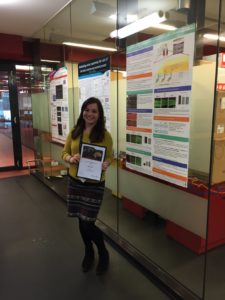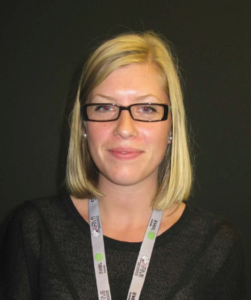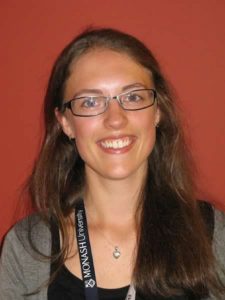At the Australian Regenerative Medicine Institute, many of the researchers are involved in undergraduate teaching at Monash University. This means they are using their theoretical and practical knowledge in regenerative research to help foster the science leaders of tomorrow.
As well as being taught by people involved in research, there are a number of opportunities for undergraduate students. They include:
- The Undergraduate Research Opportunities Program (UROP)
- Research in action projects
- Summer/Winter Vacation Scholarship Program.
Student Testimonials
 Naomi Cohen
Naomi Cohen
Can you briefly say what you liked most about being a student at ARMI?
The best part of being a student at ARMI, aside from the coffee machine, is the supportive environment here. The other students and staff are always approachable and open to questions, and encouraging when procedures don’t go as planned. Their enthusiasm for their research creates an engaging atmosphere for students.
Can you tell us in your own words why others would benefit is coming to ARMI?
There are numerous benefits of studying at ARMI. There are so many different areas of research being investigated, so students can find projects which are of particular interest to them. Researchers at ARMI are always happy to discuss their projects and the interesting directions in which they want to take them. Even more importantly than the interesting projects available is the enthusiastic researchers who supervise students. Supervisors are the teachers who work closely with students throughout their projects, and one of ARMI’s strengths is in the support which students receive from their supervisors. They provide close guidance in all aspects of the project and are always willing to make time to discuss it. Supervisors also give students the opportunity to learn a variety of experimental procedures and techniques, as well as allowing students the freedom to pursue their own ideas about the project’s direction.
Was there anything about your time at ARMI that was different or unexpected to how you thought it would be?
Research labs have an unfair reputation for being stereotypically white-walled, windowless, stifling small spaces, peopled by quiet introverts. But ARMI is the exact opposite of my preconceived stereotype. ARMI has a great combination of fascinating research and a friendly supportive environment.
Anything else about your time at ARMI you might like to add?
The only thing I’d like to add is that anyone with more questions about being a student in ARMI is more than welcome to contact me. There are so many amazing research projects available, it can be difficult narrowing down which lab you would like to be a part of, but you’ll get the most relevant information from asking current and former students about their experiences.
Lucy Hersey
Can you briefly say what you liked most about being a student at ARMI
The vibe at ARMI is so infectious. Everybody is busy and excited about their own work, but still takes the time to help each other, collaborate and be friendly. And there’s always somebody in the tea room to chat to if you need a pal.
Can you tell us in your own words why others would benefit is coming to ARMI?
I think having access to some really inspiring researchers is the biggest advantage. Whether it’s through attending seminars and lunches with guest speakers and visiting researchers, or even other group leaders around ARMI, there is a wealth of knowledge walking around that is just a conversation away from you tapping in to.
Was there anything about your time at ARMI that was different or unexpected to how you thought it would be?
I didn’t expect to be given a much freedom as I was allowed. I had the opportunity to explore ideas and try new protocols and have a go at things that hadn’t been done before. I didn’t have a supervisor hovering over me all the time and I was able to work independently, take initiative and figure out things for myself, which I really enjoyed.
Anything else about your time at ARMI you might like to add?
The espresso machine in the tea room was a lifesaver in Honours…
Harriet Manley
 Harriet participated in the Undergraduate Research Opportunities Program (UROP). She went on to complete her Honours, topping her year. Here she was awarded the University Medal for Academic Excellence (Science). During her undergraduate she did not receive a mark below 80% for her entire degree. Harriet is now a PhD student at ARMI in the Lieschke Group .
Harriet participated in the Undergraduate Research Opportunities Program (UROP). She went on to complete her Honours, topping her year. Here she was awarded the University Medal for Academic Excellence (Science). During her undergraduate she did not receive a mark below 80% for her entire degree. Harriet is now a PhD student at ARMI in the Lieschke Group .Can you briefly say what you liked most about being a student at ARMI?
I think what I like most about being at ARMI is there’s an atmosphere of support and encouragement that you don’t find everywhere. Everyone wants to see each other do well which is really nice. It’s also a challenging environment, where the expectations are high – but it’s worth it for the rewards.
Can you tell us in your own words why others would benefit is coming to ARMI?
As I said before, ARMI is a really challenging environment but really supportive, therefore a wonderful institute to come and do science. Also being a student at ARMI, there are lots of great opportunities to interact with scientists at the cutting edge of their field, and to travel to other exciting institutes.
Was there anything about your time at ARMI that was different or unexpected to how you thought it would be?
When I arrived at ARMI I had no idea the seriously amazing science that was going on in the place. And between the zebrafish, sharks, axolotls, chicks…it’s quite the menagerie!
Anything else about your time at ARMI you might like to add?
A lot of people here bake really well! Whether or not your experiments work, there’s always cake.
For more information on our undergraduate pathways program, please contact Jane McCausland via jane.mccausland@monash.edu.
